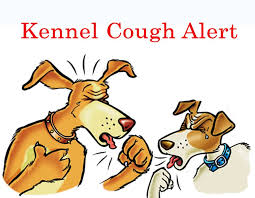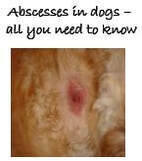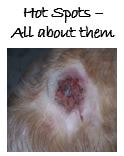What is Kennel Cough? Prevention, Symptoms and Treatment
www.akc.org
(American Kennel Club - a really great site and worth a visit!)
www.akc.org
(American Kennel Club - a really great site and worth a visit!)

What Is Kennel Cough?
Kennel Cough (also known as canine infectious tracheobronchitis) is a highly contagious respiratory disease.
Dogs commonly contract kennel cough at places where large amounts of canines congregate, such as boarding and daycare facilities, dog parks, training groups, and dog shows. Dogs can spread it to one another through airborne droplets, direct contact (e.g., touching noses), or contaminated surfaces (including water/food bowls). It’s highly treatable in most dogs but can be more severe in puppies younger than six months of age and immunocompromised dogs.
What are the Symptoms of Kennel Cough?
If your dog is affected with kennel cough, you may notice one or more of the following symptoms:
- a strong cough, often with a “honking” sound – this is the most obvious symptom
- runny nose
- sneezing
- lethargy
- loss of appetite
- low fever
The canine distemper virus and canine influenza virus both start off with symptoms nearly identical to kennel cough,” he said. Other conditions that can cause coughing include a collapsing trachea, bronchitis, asthma, and even heart disease.
How Is Kennel Cough Treated?
Typically, mild cases of kennel cough are treated with a week or two of rest, but a veterinarian may prescribe antibiotics to prevent a secondary infection and cough medication to ease the symptoms.
“Nebulizers and vaporizers utilizing inhaled antibiotics or bronchodilators have been reported to be beneficial but are usually not prescribed,” Dr. Fitzgerald said. Speak to your veterinarian for treatment recommendations. Also, it’s helpful for owners to use a harnessrather than a collar to walk a dog with kennel cough because irritation of the tracheal can aggravate the cough and possibly even cause damage to the trachea. If you have a household with multiple pets and one shows signs of a cough, chances are all dogs in the home have been exposed.
Can Kennel Cough Be Prevented?
A vaccine is available for the bordetella bacterium, which is the most common agent to cause kennel cough. Dogs who are frequently boarded, visit doggie day care, compete in canine sports, or otherwise are exposed to large groups of dogs may benefit from the vaccine, and many training, boarding, and daycare facilities require proof of vaccination. The vaccine is available in oral, intranasal, and injectable forms, and depending on the form, it is usually initially given in two doses two to four weeks apart, followed by a booster every six months to a year.
Although most cases of kennel cough are caused by bordetella, some are caused by other agents, including the bacteria bordetella bronchiseptica, canine adenovirus type 2, canine parainfluenza virus, canine respiratory coronavirus, and mycoplasmas, so the vaccine may not prevent your dog from catching the disease.
If you notice your pet coughing or if you plan to introduce your dog to large groups of animals, speak with your veterinarian.
Typically, mild cases of kennel cough are treated with a week or two of rest, but a veterinarian may prescribe antibiotics to prevent a secondary infection and cough medication to ease the symptoms.
“Nebulizers and vaporizers utilizing inhaled antibiotics or bronchodilators have been reported to be beneficial but are usually not prescribed,” Dr. Fitzgerald said. Speak to your veterinarian for treatment recommendations. Also, it’s helpful for owners to use a harnessrather than a collar to walk a dog with kennel cough because irritation of the tracheal can aggravate the cough and possibly even cause damage to the trachea. If you have a household with multiple pets and one shows signs of a cough, chances are all dogs in the home have been exposed.
Can Kennel Cough Be Prevented?
A vaccine is available for the bordetella bacterium, which is the most common agent to cause kennel cough. Dogs who are frequently boarded, visit doggie day care, compete in canine sports, or otherwise are exposed to large groups of dogs may benefit from the vaccine, and many training, boarding, and daycare facilities require proof of vaccination. The vaccine is available in oral, intranasal, and injectable forms, and depending on the form, it is usually initially given in two doses two to four weeks apart, followed by a booster every six months to a year.
Although most cases of kennel cough are caused by bordetella, some are caused by other agents, including the bacteria bordetella bronchiseptica, canine adenovirus type 2, canine parainfluenza virus, canine respiratory coronavirus, and mycoplasmas, so the vaccine may not prevent your dog from catching the disease.
If you notice your pet coughing or if you plan to introduce your dog to large groups of animals, speak with your veterinarian.
|
As a dog owner, one common condition to be aware of and keep an eye out for is an abscess.
|
The genomic signature of dog domestication reveals adaptation to a starch-rich diet – does this mean dogs are supposed to eat kibble food?
|
The irritated patch can double in size within hours and can become very painful. Common sites of lesions are the head, neck, hips and limbs. Here is all you need to know about them.
|




